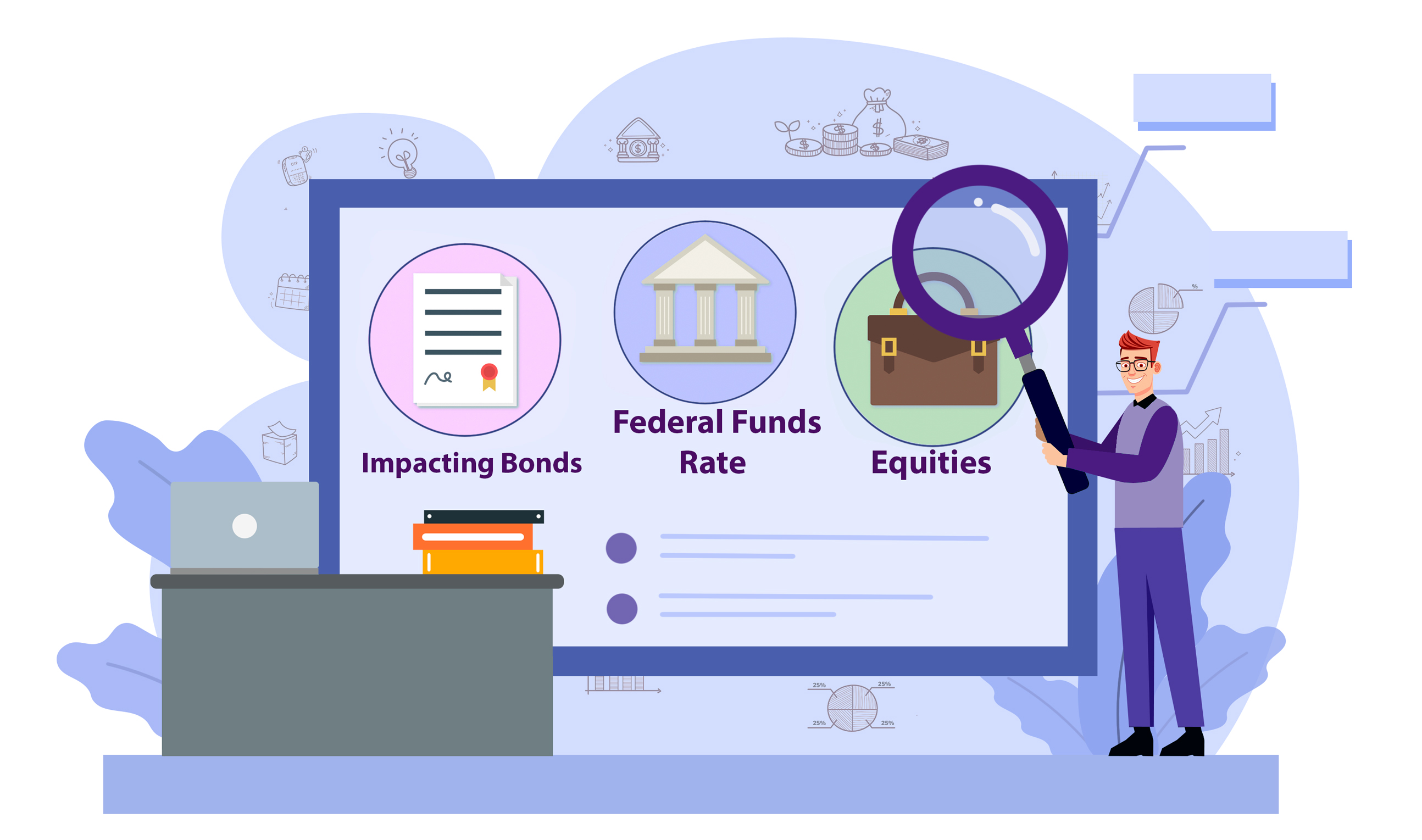
Economists have developed several different economic indicators to gauge the health of the economy and predict its future performance. These indicators are used by all the participants in the financial ecosystem such as investors, policymakers, and analysts to make better decisions. Several economic variables influence the bond market, the stock market, and the Federal Funds Rate, which is the interest rate established by the Federal Reserve. Let's look at the most significant ones first.
Investors can buy and sell bonds on a market called the bond market. Bonds are like IOUs that are issued by governments, companies, and other groups to borrow money. Investors who buy bonds are essentially lending money to the bond issuer, and they earn interest on their investments. Several economic indicators influence the bond market, including:
1. Interest Rates: When the Fed eral Reserve lifts the Federal Funds Rate, interest rates rise throughout the economy. This means loans like credit cards, auto loans, and mortgages become more expensive. It also affects bonds. When someone buys a bond, they are basically lending money to an organization or the government. In return, the organization or the government pays them back with some extra money, called interest. Now, imagine you bought a bond that pays you 3% interest. But later, new bonds come out that pay 4% interest. Other people might prefer to buy the new bonds instead of your old ones because they get more interest. So, your old bond is not as attractive anymore. Bond prices usually decrease when interest rates increase. On the other hand, when interest rates decrease, bond prices usually increase because older bonds become more attractive.
2. Inflation: Things become more expensive as a result of inflation. This can affect bonds because it changes what people think will happen next. When inflation is really high, people believe the Federal Reserve will raise interest rates to prevent the economy from getting too hot and causing more inflation. Bond prices normally fall as interest rates rise because people can get more money elsewhere. If people think interest rates will increase soon, they may not want to buy bonds now, which can make bond prices go down too. But, if inflation is really low, people may think the government will lower interest rates. This can make existing bonds more attractive, and their prices may go up.
3. Gross Domestic Product (GDP): GDP is the total value of everything made and sold in an economy. It affects the bond market in a different way than inflation. When the economy is growing quickly, investors expect inflation to go up, so the Federal Reserve might raise interest rates. This can cause bond prices to go down. But when the economy is growing slowly, investors expect the Federal Reserve to lower interest rates. This can make current bonds more appealing, causing bond prices to rise.
4. Unemployment: When many people don't have jobs, it means the economy is not doing well and inflation is usually low. Investors expect the Federal Reserve to lower interest rates in order to help the economy grow. This makes existing bonds more appealing, so bond prices go up. On the other hand, when the economy is doing really well and not many people are unemployed, this can lead to inflation going up. In this case, investors expect the Federal Reserve to raise interest rates, which can cause bond prices to go down.
The equities market is where investors can buy and sell stocks. Stocks are traded on stock exchanges but the equity market can also refer to the private market where equity stakes change hands between large investors. The equities market is affected by several economic and business indicators, including:
1. Corporate Earnings: This is the most important factor that determines equity prices. When corporate earnings are high, it can lead to higher stock prices as investors are willing to pay more for a share of a company’s profits. Corporate earnings are affected by the state of the economy. For example, if the GDP is growing, corporate earnings are likely to grow as well.
2. Jobs Reports: The monthly jobs report is one of the most important economic indicators that affect the equities markets. It provides information on the number of jobs created over the previous month, the unemployment rate, the total number of hours worked, and how much growth or shrinkage happened. It is a closely watched indicator by investors, analysts, and the Fed. A stronger-than-expected jobs report is a sign of economic strength and can drive up stock prices, while a weak jobs report can raise concerns about the health of the economy and send stock prices down. However, sometimes job reports can lead to seemingly odd market reactions. For example, a very strong jobs report can send stocks down because investors might anticipate the Fed to raise the interest rates to prevent the economy from overheating.
3. Interest Rates: The stock market is directly affected by interest rates. When the Fed raises interest rates, equities become less attractive, and as a result, their prices fall. This is because bonds that are considered safer investments provide higher yields when interest rates are high, so investors shift from equities to bonds. Conversely, when interest rates are low equity prices increase because bond returns are less attractive, and investors are forced to invest in riskier assets to generate high returns.
4. Inflation: Inflation affects the equity market both directly and indirectly. It can impact the purchasing power of consumers and the production cost of companies. When inflation is high, it negatively affects the equity market in several ways. The purchasing power of consumers falls, and at the same time, the production costs increase. Moreover, investors expect that the Fed will raise the interest rates to combat high inflation, making bonds more attractive and equities less attractive, causing their prices to fall. However, some companies benefit during times of high inflation, such as those in the energy and commodity sectors that may see their sales boom as commodity and energy prices spike during times of hyperinflation.
5. Consumer Confidence: Consumer confidence measures how positive people feel about the economy, and this affects the stock market indirectly. When people are confident, investors think companies will make more money, which can lead to higher stock prices.
As we saw above, the main factor that affects both the bond and the equities markets is the Federal Funds Rate, which is set by the Federal Reserve. The Fed takes into account several economic indicators to determine the level of the Federal Funds Rate.
The Fed has a dual mandate: to guarantee price stability and maximum employment. To achieve these goals, Fed officials adjust the Federal Funds Rate taking into account the following economic indicators:
1. Consumer Price Index (CPI) or simply inflation: The CPI is a way of measuring how prices change over time for things that people usually buy. It's used to measure inflation. When the CPI goes up a lot, the Federal Reserve might decide to raise the Federal Funds Rate to help keep inflation under control. This is because high inflation can cause prices to become unstable. However, when the CPI is low, the Federal Reserve might decide to lower interest rates in order to help the economy grow.
2. Unemployment: Maximum employment is one of the Fed’s goals, so it directly affects its decisions. When unemployment is high, the Fed typically lowers the interest rates to stimulate the economy which will lead to lower unemployment. But when unemployment is too low this may cause inflationary pressures, so the Fed may raise the interest rates.
3. GDP: The Fed officials take into account GDP trends when they make decisions on the level of the Federal Funds Rate. When GDP grows faster than economist forecasts, it may lead the Fed to increase the rates to prevent the economy from overheating, as this can lead to hyperinflation. On the other hand, if GDP grows slower than analyst forecasts, the Fed may be forced to cut the interest rates to prevent economic stagnation that can lead to higher unemployment.
There are several economic indicators that impact the bonds market, the equities market, and the Federal Funds Rate. Sometimes they can create contradictory signals and confuse investors and policymakers. For example, inflation can accelerate due to macroeconomic disruptions and not economic growth. In this case, the Fed may need to sacrifice employment for price stability. Also, sometimes extremely positive or negative economic signals may lead investors to seemingly odd reactions. For example, if GDP grows much faster than economist forecasts, which is a sign of strong economic growth, the equity market may react negatively in anticipation of higher interest rates ahead.
Although the different economic indicators may puzzle investors and policymakers at times, they are essential for understanding the performance of the economy. By understanding the above economic indicators investors, analysts, and policymakers can make more informed investment decisions.
You will receive the information that help to do investments.
Note: Check the spam folder if you don't receive an email.
